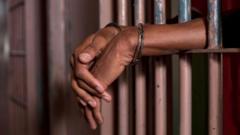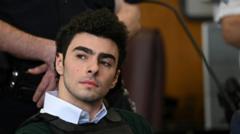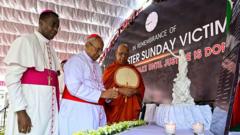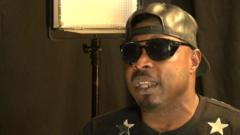A court in Nigeria's Kano state sentenced five men to death for the murder of Dahare Abubakar, who was killed after being falsely accused of witchcraft. This case has sparked national conversations about the impact of witchcraft allegations on rural safety and justice.
Death Sentence for Witchcraft Accusation Murders in Nigeria Raises Awareness

Death Sentence for Witchcraft Accusation Murders in Nigeria Raises Awareness
The conviction of five men in Nigeria for the murder of a woman accused of witchcraft brings to light the dangers of such accusations in rural communities.
In a landmark ruling, five men have been sentenced to death by hanging in Nigeria's Kano state following the murder of Dahare Abubakar, a 67-year-old woman accused of witchcraft. The heinous crime occurred in 2023 as Abubakar was working on her farm, where she was brutally beaten and stabbed. This alarming incident, tied to a belief that those accused of witchcraft are responsible for misfortunes such as illness or death, underscores the perilous consequences of such accusations in rural Nigeria.
The swift actions of Abubakar’s family led to the arrest of the suspects, who were apprehended in a village located approximately 45 kilometers from Kano, the largest city in northern Nigeria. The case, which attracted significant media attention, spurred national conversations about the persistent violence linked to witchcraft allegations in these communities.
During the trial, Judge Usman Na'abba stated that the prosecution successfully demonstrated the guilt of the five defendants beyond reasonable doubt. According to prosecutor Abba Sorondiki, the ruling aims to serve as a deterrent, discouraging wrongful accusations that lead to vigilante justice. He pointed out that the chain of events began when the sick wife of one of the accused, Abdulaziz Yahaya, claimed to have dreamt of being pursued by Ms. Abubakar while brandishing a knife, leading Yahaya to incite a group to confront her.
Musa Yahaya, the victim's son, expressed his grief, calling the day of his mother’s murder the worst of his life. However, he also articulated a sense of satisfaction upon hearing the verdict, feeling that justice was served. Meanwhile, the defense lawyer Ma'aruf Yakasai indicated that the accused intend to appeal the court's decision.
In Nigeria, while the death penalty exists, it is seldom enacted, with many sentenced often remaining in prison on death row for life. The case continues to shed light on the ongoing issue of witchcraft accusations in Nigeria, drawing attention to the societal ramifications inherent in such beliefs.
The swift actions of Abubakar’s family led to the arrest of the suspects, who were apprehended in a village located approximately 45 kilometers from Kano, the largest city in northern Nigeria. The case, which attracted significant media attention, spurred national conversations about the persistent violence linked to witchcraft allegations in these communities.
During the trial, Judge Usman Na'abba stated that the prosecution successfully demonstrated the guilt of the five defendants beyond reasonable doubt. According to prosecutor Abba Sorondiki, the ruling aims to serve as a deterrent, discouraging wrongful accusations that lead to vigilante justice. He pointed out that the chain of events began when the sick wife of one of the accused, Abdulaziz Yahaya, claimed to have dreamt of being pursued by Ms. Abubakar while brandishing a knife, leading Yahaya to incite a group to confront her.
Musa Yahaya, the victim's son, expressed his grief, calling the day of his mother’s murder the worst of his life. However, he also articulated a sense of satisfaction upon hearing the verdict, feeling that justice was served. Meanwhile, the defense lawyer Ma'aruf Yakasai indicated that the accused intend to appeal the court's decision.
In Nigeria, while the death penalty exists, it is seldom enacted, with many sentenced often remaining in prison on death row for life. The case continues to shed light on the ongoing issue of witchcraft accusations in Nigeria, drawing attention to the societal ramifications inherent in such beliefs.




















